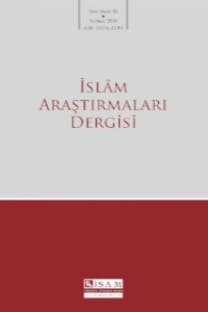İbn Haldûn ve İslâm Reformu: Bir Kavramsallaştırmaya Doðru
Veliyyüddin Abdurrahman b. Muhammed b. Haldûn et-Tûnisî el-Hadramî (H.732-808/M. 1332-1406) (hicri takvime göre) 1 Ramazan’da Tunus’ta doğdu. Aslen Yemen’in Hadramut bölgesinden olan aile, İspanya’nın Araplar tarafından fethinin ilk dönemlerinde Endülüs’te İşbîliyye’ye (Sevilla) yerleşmişti. Endülüs’ün elden çıktığı dönemde ise ataları İspanya’yı terk ederek 7. (13.) yüzyılda Tunus’a yerleşti.
Anahtar Kelimeler:
İbn Haldûn, modernite, İslami diriliş
Ibn Khaldun and Muslim Reform: Toward a Conceptualization
Muslim revival has been studied mainly as a modern phenomenon and as a reaction to Western imperialism and colonialism, and the modernization of the Muslim world. Muslim revival, however, is a much older phenomenon that dates back to the first century of Islam, which saw the first extremist groups to emerge in the Muslim world. An important theoretical resource for the study of Muslim revival is the work of 'Abd al-Rahman Ibn Khaldun. While Ibn Khaldun is well-known in both the Muslim world and the West, he has been seen more of a precursor of the various modern social sciences and as source of historical data and information, rather than as a resource for the development of theoretical perspectives. This paper introduces Ibn Khaldun's theory of state formation as a theory of Muslim revival founded on the concept of taghy¢r al-munkar and makes some remarks concerning the relevance of this theory to the study of Muslim revival.
Keywords:
Ibn Khaldun, Modernity, Muslim Revival,
___
- Gasset, José Ortega, “Abenjaldún nos revela el secreto”, Revista del Instituto Egipcio de estudios Islámicos en Madrid, 19, 1976-1978.
- ISSN: 1301-3289
- Yayın Aralığı: Yılda 2 Sayı
- Başlangıç: 1997
- Yayıncı: TDV İslâm Araştırmaları Merkezi
Sayıdaki Diğer Makaleler
Mehmed Emîn-i Tokâdî: Hayatı ve Risaleleri
Mit ve Gerçek Arasında: Arap Dünyasında İbn Haldûn Yaklaşımları
İbn Haldûn’un Toplum Metafiziğinin Güncelliği ve Günümüzde Toplum Araştırmaları Açısından Önemi
İbn Haldûn’un Gelişme Teorisi Günümüz İslâm Dünyasının Düþük Performansını İzahta Yardımcı Olur mu?
Sünnet’ten Topluma: Toplum ve Kültür Yazıları
